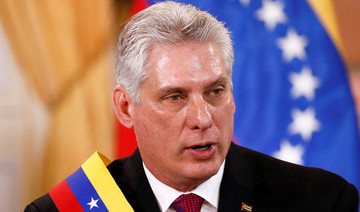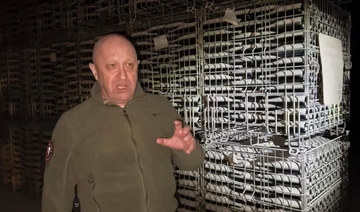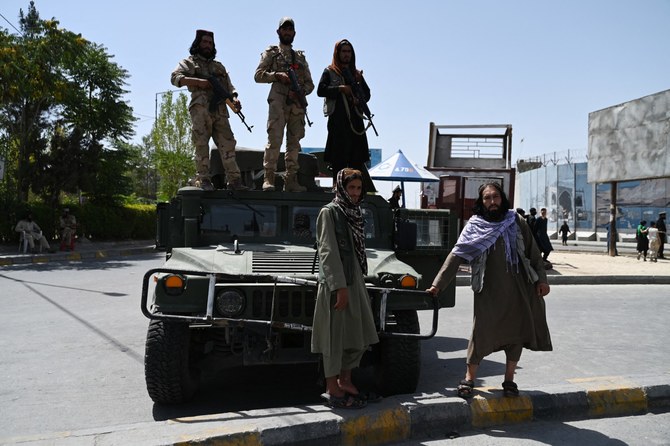HAVANA: Cuba said Wednesday that it is ending a program that sent thousands of government doctors to underserved regions of Brazil in exchange for hundreds of millions in badly needed hard currency.
The end of the “Mas Medicos,” or “More Doctors,” program signals a sharp deterioration in relations between communist Cuba and Brazil, which just elected far-right presidential candidate Jair Bolsonaro. He takes office Jan. 1.
Cuba made the announcement after Bolsonaro said the program overseen by the World Health Organization could only continue if doctors directly received their salaries from Brazil, and were able to bring their families with them during their assignments, among other conditions.
The Cuban government generally keeps most of the salaries of state employees working abroad as part of the socialist state’s “international missions.” Participants also are generally barred from bringing family members in a measure that critics say is designed to prevent doctors from emigrating.
“Mas Medicos” started five years ago under leftist President Dilma Rousseff. Cuba said roughly 20,000 doctors saw millions of patients in areas such as the Amazon rainforest and slums of major cities.
Cuba maintains similar missions in 67 other countries but “Mas Medicos” was one of the largest and most important, serving as a link between the cash-strapped island and South America’s largest economy.
“Cubans have provided a valuable service to the Brazilian people with dignity, deep sensitivity, professionality, dedication and altruism,” Cuban President Miguel Diaz-Canel wrote on Twitter. “Such humane acts should be respected and defended.”
All Cuban doctors work for the state and virtually all receive salaries that are well below $100 a month. Doctors are not permitted to leave Cuba without government permission, a control that was lifted for virtually all other Cubans five years ago.
Thousands of Cuban doctors work in the island’s public health-care system, which suffers from crumbling infrastructure but still provides free and universal health care to all citizens. Thousands of other Cuban doctors go abroad each year and generate billions of dollars for the state, one of Cuba’s most important sources of foreign exchange.
The doctors generally receive a fraction of the salary paid to the Cuban government. But even that fraction far exceeds the salaries of doctors working in Cuba. That drives many doctors to complete foreign missions in order to earn cash for important expenses like home repairs, appliances or a motor vehicle.
The Brazilian Ministry of Health said there were 8,332 Cuban doctors in Brazil, each costing the country roughly $3,100 a month, plus room and board.
Bolsonaro said Brazil would offer asylum to Cuban doctors who wished to stay in Brazil.
“This is slave labor,” he said. “We couldn’t be accomplices.”
Neither side said exactly when the Cuban doctors would be leaving but their departure comes at a bad time for Cuba, which is facing its third year of slow growth, expected to be around 1 percent this year. Productivity is low in virtually every state-run industry, tourism has slowed under the Trump administration and Venezuela, a key ally, has cut back on subsidized oil and other aid.
Nonetheless, Bolsonaro’s conditions were out of the question for Cuba.
“It’s not acceptable to question the dignity, professionalism and altruism of Cubans who, with the support of their families, provide services in 67 countries,” the Cuban health ministry said in a statement. “The Brazilian people will understand who bears the responsibility for the fact that our doctors can’t keep providing their support and solidarity in that nation.”
Cuba ends medical exchange program with Brazil
Cuba ends medical exchange program with Brazil

- The Brazilian Ministry of Health said there were 8,332 Cuban doctors in Brazil, each costing the country roughly $3,100 a month, plus room and board
- Bolsonaro said Brazil would offer asylum to Cuban doctors who wished to stay in Brazil
UK says to expel Russian defense attache as ‘undeclared military intelligence officer’
- Interior minister James Cleverly told parliament the UK would also remove the diplomatic status of several Russian-owned properties
- UK is currently a staunch NATO backer of Ukraine
Interior minister James Cleverly told parliament the UK would also remove the diplomatic status of several Russian-owned properties, including one in Sussex, southern England, and another in London “which we believe have been used for intelligence purposes.”
There would also be new restrictions on Russian diplomatic visas such as a cap on the length of time Russian diplomats can spend in the UK, he added.
The move comes with the UK concerned at an apparent increase in “malign” Russian activity on UK soil, including an arson attack on a Ukrainian-linked business allegedly orchestrated by the Kremlin.
A British man who it is claimed has links to the Wagner Group was charged in connection with that case last month.
London has previously accused Moscow of being behind the poisoning of two Russian former agents on UK soil, and of a spate of cyberattacks and disinformation campaigns.
The UK is currently a staunch NATO backer of Ukraine, providing training for troops and military equipment in the fightback against Russia.
Cleverly said the new package of measures was intended “to make clear to Russia that we will not tolerate such apparent escalations.”
He warned that Moscow would make accusations of Russophobia and spread conspiracy theories in response to his announcement.
“This is not new and the British people and the British Government will not fall for it, and will not be taken for fools by (President Vladimir) Putin’s bots, trolls and lackeys.
“Russia’s explanation was totally inadequate. Our response will be resolute and firm.
“Our message to Russia is clear: stop this illegal war, withdraw your troops from Ukraine, cease this malign activity.”
Four arrested for duping young Indian men into fighting for Russia in Ukraine
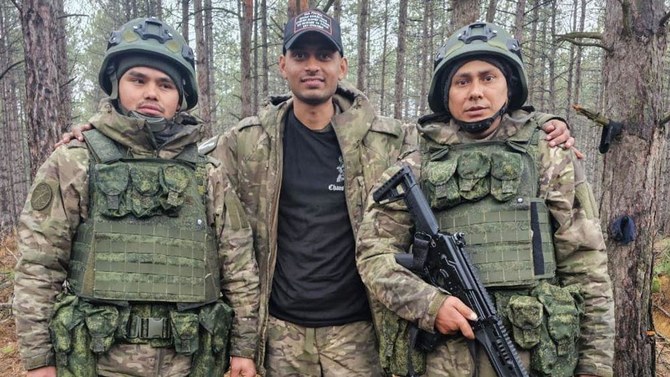
- Families of two Indian men who were killed in the war said that they had gone to Russia expecting to work as ‘helpers’ in the army
- At least 200 Nepalis are estimated to be serving in the Russian army and about 100 are missing
NEW DELHI: Indian police said four people linked to a network of human traffickers have been arrested on suspicion of luring young men to Russia with the promise of lucrative jobs or university places only to force them to fight in the war in Ukraine.
About 35 Indian men were duped in this manner, the Central Bureau of Investigation (CBI) said in March.
The four Indian nationals arrested were a translator, a person facilitating visa processing and the booking of airline tickets as well as two “main recruiters” for the southern states of Kerala and Tamil Nadu, the CBI said late on Tuesday.
The investigation “is continuing against other accused persons who are part of this international network of human traffickers,” the CBI said.
The families of two Indian men who were killed in the war have told Reuters they had gone to Russia expecting to work as “helpers” in the army.
India’s foreign ministry says each case has been “strongly taken up” with Russia. Moscow has not responded to repeated requests from Reuters for comment.
Other South Asian countries have also warned their citizens against such trafficking networks after multiple cases emerged of people being similarly duped into fighting in the Russian army.
Sri Lanka said on Wednesday that “a number” of its retired war veterans were lured to the Russia-Ukraine war front with the promise of a “handsome salary,” citizenship, and other benefits for serving in the army, none of which were granted.
“A significant number of war veterans have died and sustained injuries on the battlefield,” Sri Lanka’s Defense Ministry said, adding that the law would be “strictly enforced” in the matter.
A retired major and an employment agent have been arrested in this connection.
Nepal, which paused issuing work permits for Russia and Ukraine in January, has said several young unemployed Nepalis had been illegally recruited into the Russian army by agents who charged them hefty sums for visas.
At least 200 Nepalis are estimated to be serving in the Russian army and about 100 are missing, officials have said.
India has refused to condemn Russia over the war, calling instead for dialogue and diplomacy to end the conflict. The two countries have enjoyed a close relationship for decades, trading in items from fighter jets to tea.
India has also increased its purchase of cheap Russian oil since the war, with Moscow emerging as its top oil supplier in the last financial year for the second year in a row.
Police clearing Pro-Palestinian tent encampment at George Washington University, dozens arrested
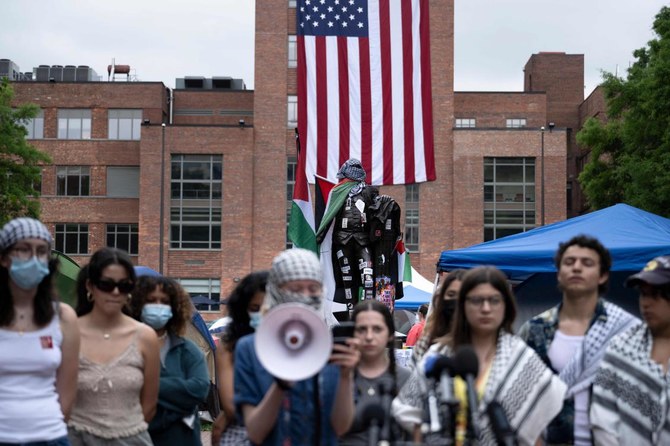
- A pro-Palestinian tent encampment was cleared at the University of Chicago on Tuesdday
- Tensions have continued to ratchet up in standoffs with protesters on campuses across the US
WASHINGTON: Police began to clear a Pro-Palestinian tent encampment at George Washington University early Wednesday and arrested dozens of protesters, hours after dozens left the site and marched to President Ellen Granberg’s home.
Officials at the university in Washington, D.C., had warned of possible suspensions for students engaging in protest activities on University Yard.
“While the university is committed to protecting students’ rights to free expression, the encampment had evolved into an unlawful activity, with participants in direct violation of multiple university policies and city regulations,” the university said in a statement.
Local media had reported that some protesters were pepper sprayed as police stopped them from entering the encampment and nearly 30 people had been arrested, according to community organizers.
In a statement, the District of Columbia’s Metropolitan Police Department said arrests were made for assault on a police officer and unlawful entry, but a number of arrests wasn’t immediately given. The department said it moved to disperse demonstrators because “there has been a gradual escalation in the volatility of the protest.”
Tuesday evening, protesters carrying signs that read, “Free Palestine” and “Hands off Rafah,” marched to Granberg’s home. Police were called to maintain the crowd. No arrests were made.
This comes as Mayor Muriel Bowser and MPD Chief Pamela Smith are set to testify about the District of Columbia’s handling of the protest at a House Committee on Oversight and Accountability hearing on Wednesday afternoon.
A pro-Palestinian tent encampment was cleared at the University of Chicago on Tuesday after administrators who had initially adopted a permissive approach said the protest had crossed a line and caused growing concerns about safety.
University President Paul Alivizatos acknowledged the school’s role as a protector of freedom of speech after officers in riot gear blocked access to the school’s Quad but also took an enough-is-enough stance.
“The university remains a place where dissenting voices have many avenues to express themselves, but we cannot enable an environment where the expression of some dominates and disrupts the healthy functioning of the community for the rest,” Alivizatos wrote in a message to the university community.
Tensions have continued to ratchet up in standoffs with protesters on campuses across the US — and increasingly, in Europe — nearly three weeks into a movement launched by a protest at Columbia University. Some colleges cracked down immediately on protests against the Israel-Hamas war. Among those that have tolerated the tent encampments, some have begun to lose patience and call in police over concerns about disruptions to campus life, safety and the involvement of nonstudents.
Since April 18, just over 2,600 people have been arrested on 50 campuses, figures based on AP reporting and statements from universities and law enforcement agencies.
But not all schools are taking that approach, with some letting protesters hold rallies and organize their encampments as they see fit.
The president of Wesleyan University, a liberal arts school in Connecticut, has commended the on-campus demonstration — which includes a pro-Palestinian tent encampment — as an act of political expression. The camp there has grown from about 20 tents a week ago to more than 100.
“The protesters’ cause is important — bringing attention to the killing of innocent people,” university President Michael Roth wrote to the campus community Thursday. “And we continue to make space for them to do so, as long as that space is not disruptive to campus operations.”
The Rhode Island School of Design, where students started occupying a building Monday, affirms students’ rights to freedom of speech and peaceful assembly and supports all members of the community, a spokesperson said. The school said President Crystal Williams spent more than five hours with the protesters that evening discussing their demands.
On Tuesday the school announced it was relocating classes that were scheduled to take place in the building. It was covered with posters reading “Free Palestine” and “Let Gaza Live,” and dove was drawn in colored chalk on the sidewalk.
Campuses have tried tactics from appeasement to threats of disciplinary action to resolve the protests and clear the way for commencements.
At the University of Chicago, hundreds of protesters gathered for at least eight days until administrators warned them Friday to leave or face removal. On Tuesday, law enforcement dismantled the encampment.
Officers later picked up a barricade erected to keep protesters out of the Quad and moved it toward the demonstrators, some of whom chanted, “Up, up with liberation. Down, down with occupation!” Police and protesters pushed back and forth along the barricade as the officers moved to reestablish control.
Dozens detained at Paris pro-Palestinian university protest
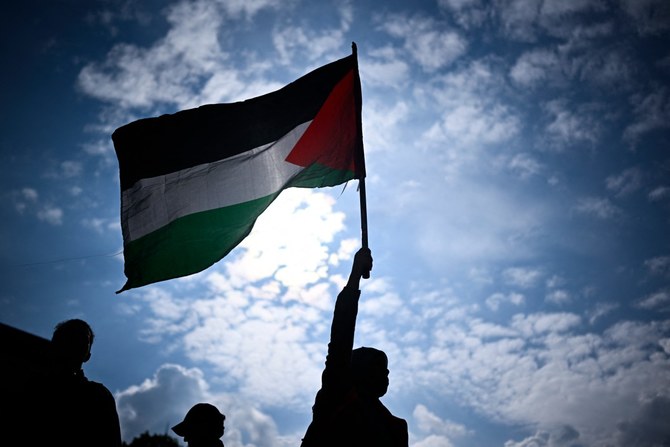
- Prime Minister Gabriel Attal said there would never be a right to disrupt France’s universities with such protests
- Police acted after about 100 students had been occupying a lecture theater for two hours
Paris: French police detained 86 people following an operation to remove students staging a pro-Palestinian occupation at the Sorbonne university in Paris, prosecutors said Wednesday.
Those arrested in the police operation on Tuesday night were being held for a variety of public order offenses, said the statement.
They include wilful damage, rebellion, violence against a person holding public authority, intrusion into an education establishment and holding a meeting designed to disrupt order. Some are also being held for participation in a group with a view to preparing violence or damage to property.
They can be held for an initial 24 hours, which can then be extended another 24 hours.
The day before police moved in, Prime Minister Gabriel Attal said there would never be a right to disrupt France’s universities with such protests.
Police acted after about 100 students had been occupying a lecture theater for two hours in “solidarity” with the people of Gaza, an AFP journalist on site noted.
Tuesday night’s police operation at the Sorbonne — and at another university on Paris’s Left Bank, Science Po university — followed interventions to end similar protests at the end of April.
Students at universities in several European countries have followed the actions on US campuses where demonstrators have occupied halls and facilities to demand an end to partnerships with Israeli institutions because of Israel’s punishing assault on Gaza.
Police have also intervened to clear campuses in the United States, Netherlands and Switzerland.
Palestinian militant group Hamas on October 7 attacked southern Israel, resulting in the deaths of about 1,170 people, mostly civilians, according to an AFP tally of Israeli official figures.
Israel estimates that 129 hostages seized on October 7, out of the 253 taken, are still being held in Gaza, including 34 the military says are dead.
Israel’s retaliatory offensive has killed at least 34,789 people in Gaza, mostly women and children, according to the health ministry in the Hamas-run besieged Palestinian territory.



